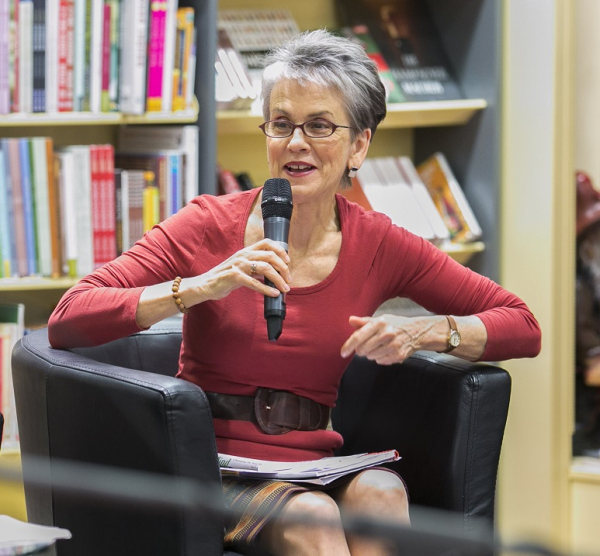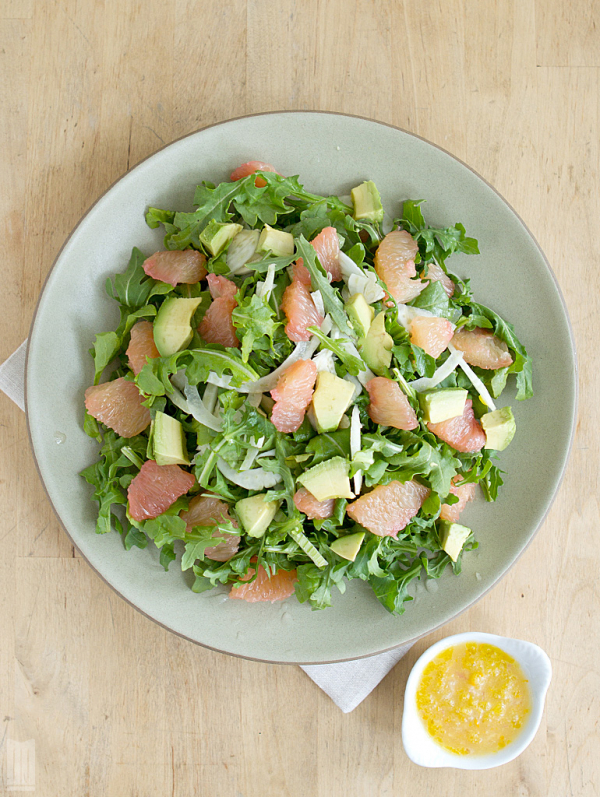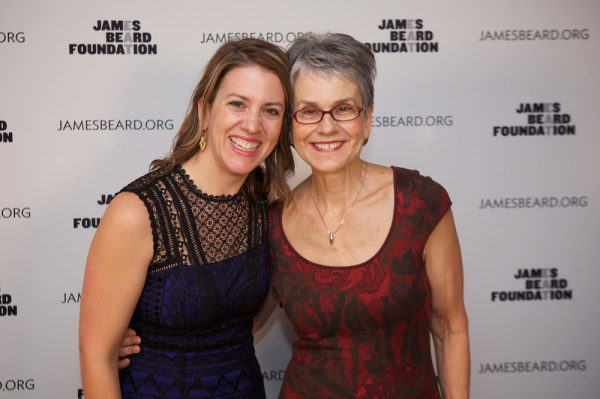Lappé talks about the intersection of democracy and food systems and the impact of her first book 50 years later ahead of a San Mateo County Libraries event Sept. 7.

Frances Moore Lappé is speaking at a San Mateo County Libraries event next week with her daughter Anna. (Photo courtesy Manahl Marielle)
Back in 1971, Frances Moore Lappé broke ground as an early advocate of plant-based eating in her first book, “Diet for a Small Planet.” Researched from the library at UC Berkeley, the 26-year-old Texas native’s book would go on to inspire generations of vegetarians, highlight the role of the meat industry in shaping food scarcity and invite people to try plant-based recipes.
More than 50 years later and with an updated introduction, Lappé’s book is more relevant than ever, highlighting the environmental and human costs of meat-heavy and highly processed diets. Her 50th anniversary edition published last fall also features recipes contributed from José Andrés, Mark Bittman, Padma Lakshmi, Mollie Katzen and Alice Waters, among others.
Lappé is the author or co-author of 20 books and founder of the Oakland-based think tank Food First and the Small Planet Institute in Massachusetts, which she leads with her daughter, author and activist Anna Lappé.
The Six Fifty recently chatted with Lappé ahead of a Sept. 7 San Mateo County Libraries talk with her daughter Anna to hear more about her pioneering career exploring the intersections of food, democracy, health and the environment.
This interview has been edited for clarity and brevity.

A fennel arugula salad from Que SeRaw SeRaw. (Photo courtesy Kerry Bitner)
The Six Fifty: “Diet for a Small Planet” first came out in 1971. Can you walk me through what it meant to publish this book at that time, and what impact it had on the public discourse around food ethics?
Frances Moore Lappé: Well, it was absolute heresy. And the irony of it all is that I grew up in Fort Worth, Texas. The nickname of Fort Worth is cow town … I just got obsessed with the question of food.
I started out as a community organizer in the war on poverty, which was so intense and meaningful to me. That our government was actually hiring young people to go door to door to help organize very poor people to move to a position that they can own their own homes – it was life-changing, to have our government on the side of really eradicating poverty. The woman I worked most closely with was a very poor woman who died of a heart attack in her 40s. I just adored Lily and I said “OK, I’ve got to get to the roots of Lily’s death.” She didn’t die of a heart attack, she died of poverty. Every day, we make choices about what we put into our bodies. And what’s distinct, of course, is that those choices link us to the earth and to one another, in a way that no other thing we do does.
At that time, the “scarcity scare” was everywhere. The Paul Ehrlich book, “The Population Bomb,” terrified people. Young women were saying, “Oh, I can’t have children, because there’s not enough food.” And I was just stunned to realize, literally putting the numbers together in UC Berkeley’s library, that there was more than enough for all of us – more than enough – and that scarcity was not the question at all. It’s what we do with what we grow.
We were greatly shrinking the capacity of the earth to feed us by feeding so much livestock. Today, for example, we devote 80% of our agricultural land to livestock that give us only 18% of our calories. If cows were a country, they would be the third-largest greenhouse gas emitter.
I’m really grateful for that youthful instinct, and that I had the freedom to explore. My children’s father, my former husband Marc Lappé, was a postdoc at UC Berkeley, and as the wife of a postdoc, I could audit courses. We could live on his salary, believe it or not. It was nothing, like $7,000 a year, but we could live on the Bay with that money and I had the freedom to just follow my nose. And I had access to the UC libraries … that was my beginning.
The Six Fifty: You mentioned that it was heresy when it came out: What was that response like? And how did that shape your decisions to pursue this work?
Frances Moore Lappé: One reaction I got from vegetarians was, “Oh, my parents thought I would die if I didn’t eat meat and now they’re not so worried. So you’ve given great comfort in my family.” On the other hand, in the early ‘70s, the (National Cattlemen’s Beef Association) prepared a document trying to argue with my points. So it really was a very new message. But I really think it was part of a movement that allowed people to make conscious decisions, not just about our own individual health, but the health of all. I was just so proud to be part of that shift where we made those connections.
The Six Fifty: Democracy is a big part of your writing. Could you walk me through some of the examples that you’ve seen of how people use democratic practices to engage with their food systems differently?
Frances Moore Lappé: Every choice we make is, in a sense, a vote for the world we want, including our own health and our children’s health … And democracy should mean all of us have a voice in creating the world that we want, and that we can thrive for our progeny. I’ve focused on democracy because ours is so flawed, so corrupted. For example, we have more agribusiness lobbyists who have the ears of members of Congress than oil and gas lobbyists. There are like 1,200 agribusiness lobbyists in Washington, plying their world view and their profit interests.
We can’t save our planet and our bodies and our spirits without true democracy. I had to find a way to link it all. … Democracy is not just a structure of government, it’s a way of life. We are consciously choosing what is healthy and what is fair. It’s not just about voting, although that is critical.
I’m not saying never, ever touch meat. I don’t eat meat, but it’s really about what is the center of our diet, and what are the resources that we’re using … This highly processed, overprocessed diet is robbing us; we’re getting calories without nutrition. Something like 60% of the calories that Americans eat give us no nutrition. Because of so much private interest influencing political decisions, we have a diet that is literally killing us.
I didn’t know until I finished (writing the latest book) that the World Health Organization has designated red meat as a probable carcinogen and processed meat as a known carcinogen. I don’t think Americans know that.

Frances Moore Lappé with her daughter Anna Lappé at the 2016 James Beard Foundation Awards. (Photo courtesy Clay Williams for The James Beard Foundation. © Clay Williams / claywilliamsphoto.com)
The Six Fifty: Your daughter Anna also leads the Small Planet Institute with you. What’s it like to have this next generation of your family doing that work with you?
Frances Moore Lappé: It’s so rewarding. I learn so much from her. She and I co-founded Small Planet Institute, and then she went on to create Real Food Media. One of the things that she’s been involved in is the real food purchasing program. She’s been supporting schools and institutions to purchase locally and to provide more whole foods and more plant foods. So many people get their diet from institutions, so I thought that was a brilliant choice to make.
The best decision I think I’ve ever made as a parent and maybe a person (was) 22 years ago, we traveled the world together. Anna and I ended up writing our book “Hope’s Edge.” We talked to people who are pushing forward the edge of hope, and it just changed our lives because we realized so much positive is happening.
It’s just so exciting to see the positive change. It’s hard to even remember how radical it was to be an American and to say that you could have a healthy meal without meat centering it. When I was growing up in Texas, you’d say, “What’s for dinner mom?” and she’d tell you what meat.
The Six Fifty: In this new edition of “Diet for a Small Planet,” there are some new recipes from a fair number of luminaries in the food world. What was the process of compiling those like? And did you have a favorite recipe?
Frances Moore Lappé: Oh, I can’t give favorites. That would really be messy. People often asked me, “Well, was it difficult to give up meat?” … It was all about enrichment. The whole plant world is where all the diversity is: of color, texture, taste and of culture, because you go into different cultural cuisines and different plants are at the center. To me it felt like not like shutting down, but opening up. I don’t know if other people experienced this, but I was a classic calorie counter, always getting on the scales and wanting to be lighter. And once I moved to a plant-centered diet, I totally stopped that. I just got to the weight that felt good and I’ve been that way ever since. My tastes changed and I just wanted what was good for me.
The Six Fifty: The book lays out a lot of reasons to be pretty concerned about the environmental impacts of our eating systems, but also shares some positive signs of hope. What is one thing that you think people can or should be doing differently around food to reduce their environmental impacts?
Frances Moore Lappé: In addition to moving to plant foods? Another huge factor is biodiversity. David Attenborough says that we are on the edge of the sixth great extinction and that there’s a huge threat of insect extinction over the next decade or so. So many pesticides are used to grow these feed crops, and 44% of are poisoned from pesticides.
Food is the one choice we make multiple times a day that connects us to everyone, and the earth. To make that consciously is so empowering.
What comes to mind are Indian women I met not many years ago. A couple of decades ago, they had nothing, they had no voice, and then they started moving towards organic farming and they started diversifying their crops. They’ve made a women’s group, share their learning and all support one another. It became so powerful that they got their own radio station, and their food is now being used in the local schools in that part of India. (As I was leaving) I heard all this rustling behind me – they were racing after me. They said, “We forgot to tell you the most important thing was that we found our courage.”
Courage is the key virtue right now for our planet, for humanity. I used to have this poster of Eleanor Roosevelt who said, “Do something every day that scares you.” I think that’s brilliant, because it takes courage to break with the pack if the pack is heading over the cliff.
We’ve got to break. And still, we’re still caught in this chemical trap that is contributing to our ill health and to climate catastrophe and poisoning people. To find our courage, though, we need to find a person who can support us. That’s what I always tell people – just find one buddy who’s making the kinds of changes that you want to make and share a recipe and share the next step. And you don’t have to feel alone. … There’s so many networks now.
The Six Fifty: Is there anything else you want to add?
Frances Moore Lappé: It’s become my theme song in some ways, that in a world of continuous change in which everything is connected, it is not possible to know what’s possible. So I call myself a possiblist. All humans need to feel that their actions possibly can make a difference. I think that it is possible that every single choice we’re now making could come together to really make a change toward life. And that’s what we need to focus on.
Frances Moore Lappé and her daughter Anna Lappé will speak at an online San Mateo County Libraries talk from 5-6 p.m. on Wednesday, Sept. 7. Frances will introduce her revised and updated ‘Diet for a Small Planet’ before taking questions from the audience. Register for the talk here.
Dig into food news. Follow the Peninsula Foodist on Instagram and subscribe to the newsletter to get insights on the latest openings and closings, learn what the Foodist is excited about eating, read exclusive interviews and keep up on the trends affecting local restaurants.




